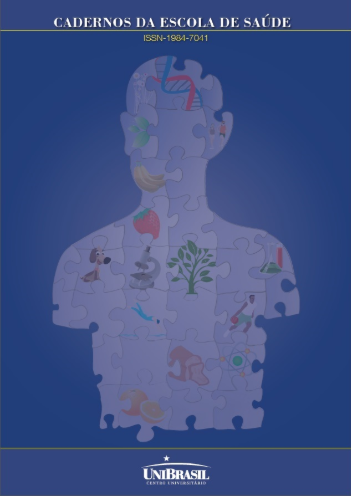Development of high protein antiemetic ice cream for oncologyc patients in chemotherapy treatment
Main Article Content
Abstract
Cancer is the name given to a set of diseases characterized by the disorderly growth of cells that force their way into tissues and organs in our body. These cells divide rapidly, usually in an aggressive and uncontrollable way, and they can spread to other regions of the body. Studies show that the majority of cancer patients in chemotherapy treatment suffer side effects, such as mucositis, nausea and vomit, consequently having a poor diet that causes a nutritional risk. Due to the nutritional complications that these patients have and their difficulty in eating, as consequences of the side effects, this study aimed to develop an antiemetic ice cream with a high protein level, as it is made from Whey protein® and ginger. The product developed had a high protein content, with 13,4g of protein per serving, possible antiemetic property, it contains 1,2g of ginger per serving, and has shown a good sensory quality. Thus, the product developed can be used as an adjunct in the treatment of cancer patients undergoing chemotherapy treatment and can help in improving food intake and in reducing nausea and emesis.
Article Details

This work is licensed under a Creative Commons Attribution-NonCommercial-ShareAlike 4.0 International License.
We transfer the copyright pertaining to the manuscript, accepted for publication in this journal, to the exclusive property of Cadernos da Escola de Saúde, and we agree that partial or total reproduction in any means of dissemination, printed or electronic, without the prior and necessary authorization is requested from the Journal's Board of Directors.
References
[2] Instituto Nacional do Câncer. O que é câncer? [Internet]. 2019. Disponível em: URL:
[3] Corrêa FE, Alves MK. "Quimioterapia: Efeitos Colaterais e Influência no Estado Nutricional de Pacientes Oncológicos." UNICIÊNCIAS. 2018; 2(22): 100-105.
[4] Barreto AMC, Toscano BAF, Fortes RC. Efeitos do gengibre (Zingiber officinale) em pacientes oncológicos tratados com quimioterapia. Comun. ciênc. Saúde. 2012; 257-270.
[5] Hsieh RK, et al. Baseline patient characteristics, incidence of CINV, and physician perception of CINV incidence following moderately and highly emetogenic chemotherapy in Asia Pacific countries. Supportive Care in Cancer. 2015; 23.1: 263-272.
[6] ANDRADE, Viviane; SAWADA, Namie Okino; BARICHELLO, Elizabeth. Qualidade de vida de pacientes com câncer hematológico em tratamento quimioterápico. Revista da Escola de Enfermagem da USP, v. 47, n. 2, p. 355-361, 2013.
[7] TALAVERA, Karel et al. Heat activation of TRPM5 underlies thermal sensitivity of sweet taste. Nature, v. 438, n. 7070, p. 1022-1025, 2005.
[8] TRINIDADE, Aaron et al. Soft, fortified ice-cream for head and neck cancer patients: a useful first step in nutritional and swallowing difficulties associated with multi-modal management. European Archives of Oto-Rhino-Laryngology, v. 269, n. 4, p. 1257-1260, 2012.
[9] OKKELS, S. L. et al. An investigation into between-meal food desires among hospitalised haematological cancer patients. Clinical Nutrition, v. 35, n. 2, p. 440-445, 2016.
[10] WALLADBEGI, Java; SVANBERG, Anncarin; GELLERSTEDT, Martin. Protocol for a randomised controlled trial to study cryoprevention of chemotherapy-induced oral mucositis after autologous stem cell transplantation. BMJ open, v. 8, n. 10, p. e021993, 2018.
[11] NAWI, Ros Idayu Mat et al. Oral Cryotherapy: Prevention of oral mucositis and pain among patients with colorectal cancer undergoing chemotherapy. Clinical journal of oncology nursing, v. 22, n. 5, 2018.
[12] WANG, Li et al. Efficacy of oral cryotherapy on oral mucositis prevention in patients with hematological malignancies undergoing hematopoietic stem cell transplantation: a meta-analysis of randomized controlled trials. PloS one, v. 10, n. 5, 2015.
[13] PALHARIN LHDC., NETO EF, LOPES, MPC, BOSQUÊ GG. Estudo sobre gengibre na medicina popular. Revista Cientifica. 2008.
[14] Ryan JL, et al. Ginger (Zingiber officinale) reduces acute chemotherapy-induced nausea: a URCC CCOP study of 576 patients. Supportive care in câncer. 2012; 20.7: 1479-1489.
[15] SAAD, M, et al. Uso do gengibre para controle de náusea e vômito. Revista Integrativa do Instituto Israelita de Ensino e Pesquisa. 11(1):29-30, 2013.
[16] WHITE, Brett. Ginger: an overview. American family physician, v. 75, n. 11, p. 1689-1691, 2007.
[17] Bossi P, et al. A randomized, double-blind, placebo-controlled, multicenter study of a ginger extract in the management of chemotherapy-induced nausea and vomiting (CINV) in patients receiving high-dose cisplatin. Annals of Oncology. 2017; 28.10: 2547-2551.
[18] Lima RMT, et al. Protective and therapeutic potential of ginger (Zingiber officinale) extract and [6]‐gingerol in cancer: A comprehensive review. Phytotherapy research. 2018; 32.10: 1885-1907.
[19] Bumrungpert A, Pavadhgul P, Nunthanawanich P, Sirikanchanarod A, Adulbhan A. Whey protein supplementation improves nutritional status, glutathione levels, and immune function in cancer patients: a randomized, double-blind controlled trial. Journal of medicinal food. 2018; 21(6), 612-616
[20] Devries MC, Stuart MP. Supplemental protein in support of muscle mass and health: advantage whey. Journal of food Science. 2015; 80.S1: A8-A15.
